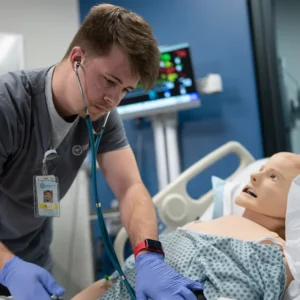
Are you thinking about a career as a dental assistant? It can be a fun, fast-paced, and challenging career that comes with a variety of responsibilities. What’s more, you will be a valuable member of the dental team, with comprehensive and varied duties. To be a great dental assistant and perform the daily tasks needed, you need a broad set of skills — technical, administrative, and people — to provide patients with high-quality oral care. Here’s a look at what dental assistant work actually looks like and the skills needed to succeed.
Duties of a Dental Assistant
Dental assistants provide patient care and chair-side support as dentists complete exams and procedures. Most visibly, people may see dental assistants passing instruments, but that’s just the beginning of their technical skills. Other technical duties of a dental assistant may include:1
- Assisting with dental procedures such as fillings, crowns, and extractions
- Taking & pouring dental impressions (molds of the mouth)
- Preparing patients for surgery
- Operating equipment and monitors
- Talking with patients
- Performing administrative tasks
- Preparing examination areas
- Cleaning up after procedures
- Sterilizing equipment
Dental assistants can perform some polishing or explain proper dental hygiene to patients, but most often, their patient contact occurs when working with a dentist on procedures during which he or she could benefit from extra help. Dental assistants differ from dental hygienists in that dental hygienists perform much more unsupervised work on patients.
Skills Needed to Be a Dental Assistant
If you’ve decided to pursue a career in dentistry, you may be wondering, “what does it take to be a dental assistant?” Because the duties are so broad, you will need a variety of skills.
 Technical Skills
Technical Skills
A large part of a dental assistant’s job is to help dentists perform procedures. Dental assistants work closely with dentists to perform tasks such as fillings, crowns, and other procedures.1 Some technical skills that may help include:2
- Knowledge of advanced dental procedures in order to anticipate the order of operations
- Ability to take X-rays, blood pressure readings, and dental impressions
- Knowledge of dental materials and equipment maintenance
To be allowed to do more advanced functions, such as taking X-rays or performing coronal polishes, many states require dental assistants to be licensed or certified, and those requirements vary by state.
 People Skills
People Skills
Not everybody loves going to the dentist. A dental assistant is often the first face that patients see when they walk through the door, so you need to be friendly and compassionate. That’s why good people skills are so important. You may need to:1 2
- Settle patients in and prepare them for their check-ups, surgery, or procedure.
- Ask about their medical history.
- Be a good listener.
- Help patients feel comfortable before, during, and after treatment.
- Be a good communicator, as you’ll provide oral hygiene and care instructions after procedures or surgery.
 Admin Skills
Admin Skills
Many jobs come with administration duties, and this one is no different. On top of your technical abilities and people skills, you’ll be asked to do a variety of admin tasks on a daily basis. The scope of those tasks will vary from office to office but could include:2
- Performing office management tasks, including computer-based work
- Communicating with patients to schedule appointments, making reminder calls, and even sorting out billing issues
- Monitoring and ordering supplies when needed
How to Become a Dental Assistant
Some states do not require formal education to become a dental assistant, meaning that paths to the workforce can vary.3 It’s best to look up your state’s requirements before proceeding. Many people typically take classes through a school or technical program where you will develop the technical skills for the job. Dental Assisting programs can take between one and two years to complete, depending on whether the desired outcome is a certificate, diploma, or associate degree. After your education, Dental Assisting National Board (DANB) licensure is required in 39 states. To learn if you need to sit for state licensure, you can check their website.4 Individuals seeking to enter this field may be subject to screenings such as, but not limited to, criminal background checks and drug/alcohol testing prior to externship, to attain occupational licensure/certification or employment, and throughout their careers. Within the State of California, Carrington College Dental Assisting program graduates are able to apply for and take the State of California Dental Board examination for licensure as a Registered Dental Assistant (RDA). Carrington College prepares students to take appropriate certification and licensure exams related to their individual majors. The College does not guarantee students will successfully pass these exams or be certified or licensed as a result of completing the program. Most people will work full-time, and some work evenings or weekends.5
Kickstart Your Career in Dental Assisting
Dental assisting is a career path with plenty of exciting duties. If you’re interested in learning more about how to pursue your certificate, Carrington College offers a Dental Assisting program that can be completed in as few as nine months. Contact us to request more information.
 Technical Skills
Technical Skills People Skills
People Skills Admin Skills
Admin Skills


